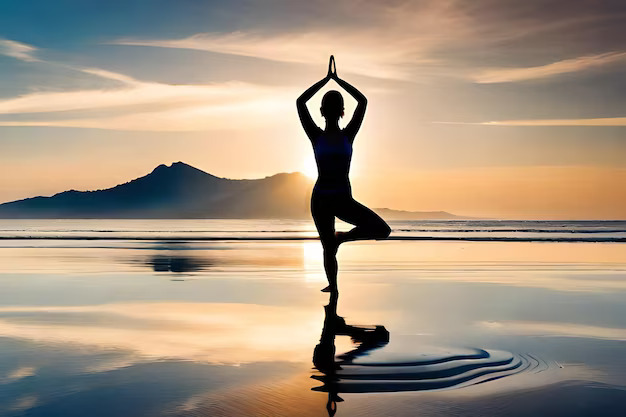How Yoga Can Make a Difference in Your Life.
Introduction:
In the chaos of our fast-paced lives, finding solace and equilibrium seems like an ever-elusive quest. Amidst the demands of work, relationships, and the constant digital buzz, the ancient practice of yoga emerges as a sanctuary—a transformative journey that extends far beyond the physical postures. In this exploration, we unravel the myriad ways in which free yoga courses can make a profound and lasting difference in your life, touching upon the realms of physical well-being, mental clarity, emotional balance, and a deeper connection with oneself and the world.
1. Physical Well-being: Nurturing the Temple of the Body
At its foundation, yoga is a celebration of the body. The practice of various asanas (postures) engages muscles, tendons, and joints, promoting flexibility, strength, and overall physical vitality. From the dynamic flow of Vinyasa to the precise alignment of Iyengar, each style contributes to the holistic well-being of the body. The benefits extend beyond the mat, influencing daily movement, posture, and resilience against physical ailments.
The breath, a cornerstone of yoga, acts as a bridge between the physical and mental realms. Pranayama, or breath control, enhances lung capacity, increases oxygen intake, and calms the nervous system. Through conscious breathing, practitioners cultivate a deeper connection with their bodies, unlocking the potential for profound physical transformation.
2. Stress Reduction: Crafting Calm in the Storm
In a world characterized by constant demands and unrelenting stressors, the significance of stress reduction cannot be overstated. Yoga provides a sanctuary for the mind, a refuge where the incessant chatter can be hushed, and the nervous system can find respite.
The mindful movements and intentional breathwork inherent in yoga induce a relaxation response, reducing cortisol levels—the primary stress hormone. This not only fosters a sense of calm during the practice but leaves a lasting impact on how individuals navigate the challenges of everyday life. By integrating stress reduction techniques into the fabric of daily routines, yoga becomes a potent antidote to the modern epidemic of chronic stress.
3. Mental Clarity and Focus: Cultivating Presence in a Distracted World
Beyond the physical postures, yoga is a journey into the depths of the mind. The meditative aspects of the practice invite practitioners to cultivate mindfulness and present-moment awareness. Through concentration and focus, the mental chatter begins to subside, revealing a profound clarity that extends beyond the mat.
Studies have shown that regular yoga practice can enhance cognitive function, improve memory, and sharpen concentration. As the mind becomes a more focused and receptive instrument, individuals find themselves better equipped to tackle the cognitive demands of work, study, and creative endeavors.
4. Emotional Balance: Navigating the Inner Landscape
Yoga is a voyage inward, an exploration of the vast landscape of emotions. The practice invites individuals to observe and embrace their feelings without judgment, fostering emotional intelligence. Through mindful awareness and introspection, practitioners develop the ability to respond to emotions in a balanced and constructive manner.
The asanas themselves can be a cathartic release, allowing emotions stored in the body to surface and dissipate. This emotional release, coupled with the meditative components of yoga, creates a harmonious equilibrium within, positively influencing how individuals navigate relationships and respond to life's inevitable ups and downs.
5. Improved Sleep Quality: Embracing Rest and Renewal
In a society plagued by sleep disorders and restless nights, the quest for restful sleep has never been more crucial. The relaxation techniques embedded in yoga, particularly those focused on the breath and gentle movements, prepare the body and mind for a rejuvenating night's sleep.
Establishing a bedtime yoga routine signals to the body that it is time to unwind, promoting a seamless transition into restorative sleep. As the mind calms and the body relaxes, the sleep cycle becomes more synchronized, contributing to improved sleep quality and overall well-being.
6. Community and Connection: The Yoga Sangha
Yoga, traditionally a solitary practice, has found a communal dimension in modern times. Joining a yoga class or participating in group sessions transforms the practice into a shared journey. The yoga sangha, or community, becomes a source of support, encouragement, and shared growth.
The collective energy of a group amplifies the transformative power of yoga. The shared commitment to self-discovery creates a space where individuals can connect not only with themselves but with like-minded souls on a similar path. This sense of belonging fosters a supportive network, enhancing the overall transformative experience of yoga.
Conclusion:
In the intricate tapestry of life, where threads of physical health, mental clarity, emotional balance, and interconnectedness weave together, yoga stands as a masterful artisan. Its transformative power transcends the boundaries of a mere physical practice, becoming a profound journey into self-discovery and well-being.
So, unroll your mat, step onto this transformative path, and allow the harmonizing influence of yoga to permeate every facet of your existence if you want to learn yoga than enroll in the online yoga courses. From the dynamic asanas that sculpt the body to the meditative practices that quiet the mind, yoga unveils a holistic approach to living—a path toward harmony and self-realization. In the serenity of each breath and the mindful movements, discover the transformative power of yoga and embrace the profound difference it can make in your life.




Comments
Post a Comment